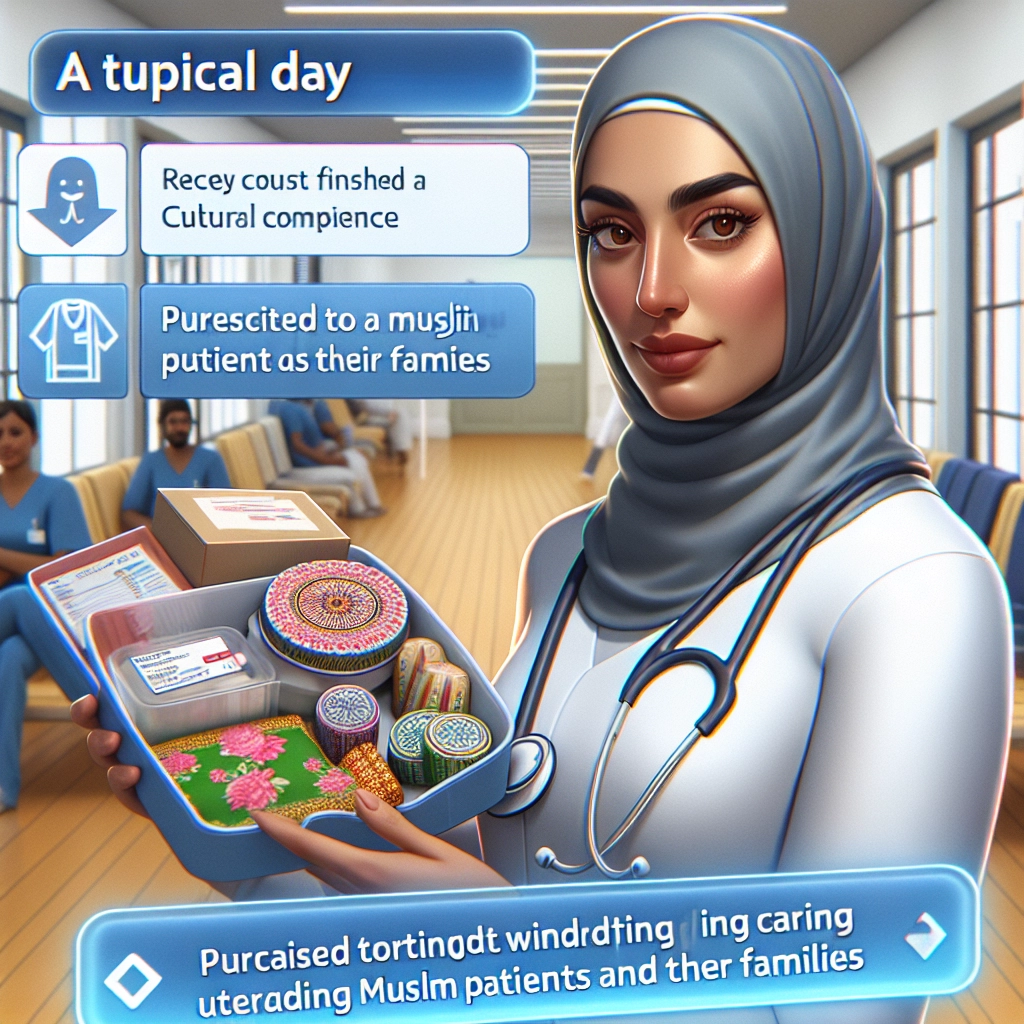

Cultural competence in healthcare is crucial for addressing the unique needs of diverse populations, including Muslim patients and their families. Understanding the cultural and spiritual values of Muslim patients is essential for providing quality and respectful healthcare services.
Healthcare professionals must be aware of important differences in diet, modesty, privacy, touch restriction, and alcohol intake restriction when caring for Muslim patients.
Check out this Youtube video on “cultural competence in the care of Muslim patients and their families” to gain valuable insights and knowledge on providing healthcare for the Muslim community:
Cultural Competence in Healthcare
Defining cultural competence in the healthcare setting
Cultural competence in the healthcare setting refers to the ability of healthcare providers and organizations to understand and effectively meet the unique cultural and linguistic needs of patients from diverse backgrounds. It involves adapting practices to ensure respectful and responsive care, considering cultural beliefs, values, and practices without imposing personal biases or assumptions.
The impact of cultural competence on patient care
Cultural competence has a profound impact on patient care as it enhances communication, builds trust, and fosters better patient-provider relationships. By addressing cultural differences and respecting individual values, healthcare providers can create a more inclusive and welcoming environment for diverse patient populations.
This ultimately leads to improved health outcomes, increased patient satisfaction, and better compliance with treatment plans.
Understanding Muslim Cultural Practices
Overview of Muslim cultural practices
Muslim cultural practices are deeply intertwined with religious beliefs and traditions. The Five Pillars of Islam, including shahadah (the statement of faith), salat (prayer five times a day), zakat (charitable giving), sawm (fasting during Ramadan), and hajj (pilgrimage to Mecca), form the foundation of Muslim life and influence various aspects of daily living.
The role of religion in the lives of Muslim patients
Religion plays a central role in the lives of Muslim patients, guiding their decision-making, family dynamics, health practices, and views on illness and death. The Islamic faith shapes their approach to healthcare, influencing treatment decisions and end-of-life care.
Understanding and respecting the religious viewpoints of Muslim patients is crucial for providing culturally competent and respectful medical care.
Cultural Competence Training
Healthcare professionals must undergo cultural competence training to understand and respect the diverse values, beliefs, and practices of Muslim patients and their families. This training is crucial for providing inclusive and effective care while fostering trust and cooperation.
Importance of cultural competence training for healthcare professionals
Cultural competence training equips healthcare professionals with the necessary skills to navigate intercultural communication, mitigate potential barriers to care, and implement policies that cater to the needs of culturally diverse patients. It promotes empathy, understanding, and respect, leading to improved patient outcomes and satisfaction.
Key components of cultural competence training for working with Muslim patients
The training encompasses education on Muslim cultural and spiritual values, including dietary restrictions, modesty principles, privacy considerations, and alcohol intake limitations. It also emphasizes the significance of language interpretation services and the recruitment of staff from minority backgrounds to enhance cultural awareness and sensitivity.
| Components of Cultural Competence Training for Muslim Patients | |
|---|---|
| Intercultural Communication Skills | Understanding Muslim Dietary Restrictions |
| Barriers to Care Identification | Cultural Sensitivity Policies Implementation |
| Language Interpretation Services | Minority Staff Recruitment & Training |
Effective Communication Strategies
Strategies for effective communication with Muslim patients and their families
To effectively communicate with Muslim patients and their families, it is crucial to respect their cultural and religious beliefs. Take the time to understand their values, customs, and traditions, and show genuine interest in learning about their background.
Addressing language barriers and communication preferences
When addressing language barriers, healthcare providers should offer interpretation services in the patient’s preferred language. It is essential to use professional medical interpreters to ensure accurate communication.
Additionally, adopting visual communication aids and written materials in multiple languages can also facilitate effective communication.
| Communication Strategy | Description |
|---|---|
| Use of Professional Interpreters | Ensure accurate and clear communication by engaging trained medical interpreters who are fluent in the patient’s language and understand cultural nuances. |
| Visual Communication Aids | Employ visual aids such as pictograms, illustrations, and videos to convey important health information, especially when language barriers exist. |
| Written Materials in Multiple Languages | Provide written materials, including healthcare instructions and educational resources, in languages preferred by the patients and their families. |
Respect for Religious Practices
Cultural competence in the care of Muslim patients and their families requires a deep respect for religious practices and beliefs in the healthcare setting. Healthcare providers should acknowledge and accommodate the religious needs of Muslim patients to ensure they receive compassionate and culturally sensitive care.
Providing appropriate accommodations for Muslim patients involves understanding and respecting their religious practices. This includes ensuring access to prayer facilities, such as an interfaith room, to facilitate their daily prayers.
It also involves making accommodations for Halal food and coordinating with pharmacy departments to source medicines that align with their religious dietary restrictions.
Addressing Dietary Needs
Understanding dietary restrictions and practices in Muslim culture
In Muslim culture, all foods are considered halal except for pork and its by-products, animals improperly slaughtered, non-halal meat, and blood. Fasting is also a significant practice, particularly during the month of Ramadan.
Muslims fast from dawn till dusk, refraining from eating, drinking, and taking oral medications. It’s crucial to respect their fasting practices and dietary restrictions during this sacred period.
Providing appropriate dietary options for Muslim patients
Healthcare providers must ensure the availability of halal food options for Muslim patients. This includes fruits, vegetables, grains, beef, poultry, lamb products, seafood, and nutrient-dense foods.
If ordering special meals from certified halal food providers isn’t feasible, patients should be offered choices that align with their dietary requirements, such as vegetable, egg, milk, and fish options.
Providing Gender-Specific Care
Addressing gender-specific care requirements for Muslim patients
When providing care for Muslim patients, it’s essential to address specific gender requirements. This involves respecting and accommodating the gender preferences of healthcare providers requested by the patients.
Understanding and adhering to these preferences contribute to a more comfortable and respectful healthcare experience for the patients.
Respecting modesty and privacy concerns
Respecting the modesty and privacy concerns of Muslim patients is crucial in ensuring culturally competent care. Healthcare providers should ensure that modesty and privacy are upheld throughout the care process, taking into consideration practices such as providing gender-specific facilities and modest attire options.
This demonstrates respect for the patient’s cultural and religious values, fostering trust and confidence in the healthcare provider.
Awareness of Healthcare Decision Making
Understanding the role of family in healthcare decision-making for Muslim patients
The family plays a crucial role in healthcare decision-making for Muslim patients. It is important to involve and respect the input of family members, as they often influence and participate in the decision-making process.
Respecting family dynamics and support systems
Understanding and respecting the unique family dynamics and support systems within Muslim households is essential for providing culturally competent care. This includes being mindful of gender roles, familial hierarchies, and the concept of collective decision-making.
| Family Role | Significance |
|---|---|
| Decision-Making | Involvement of family members in medical decisions, considering the collective well-being. |
| Support Systems | Acknowledgment of extended family support and involvement in the patient’s care and decision-making. |
Religious Observances and Healthcare
Accommodating religious observances in the healthcare setting
Healthcare providers should accommodate religious observances by understanding and respecting the religious practices of Muslim patients and their families. This may include providing a private and clean space for prayer or worship, respecting modesty requirements during medical exams, and accommodating dietary restrictions based on religious beliefs.
Addressing the impact of religious observances on patient care
It’s crucial to recognize the impact of religious observances on patient care, as these practices can influence treatment decisions and care plans. Healthcare professionals should engage in open and respectful dialogue with Muslim patients and their families to address any potential conflicts between religious observances and medical interventions, ensuring that care is provided in a culturally sensitive and respectful manner.
Cultural Competence and Mental Health
Understanding the intersection of culture and mental health for Muslim patients
Cultural competence in mental healthcare for Muslim patients is crucial due to the unique intersection of cultural and religious beliefs with mental health. Understanding the influence of Islam on their perceptions of mental illness and treatment can help healthcare providers deliver more effective care.
Providing culturally sensitive mental healthcare services
Delivering culturally sensitive mental healthcare services to Muslim patients involves acknowledging and respecting their spiritual and religious beliefs. Tailoring treatment approaches to align with their cultural values and addressing any stigmas associated with mental illness within their community is essential for providing effective care.
Case Studies and Examples
Real-life examples of culturally competent care for Muslim patients
-
During a health assessment, a Muslim patient expressed concerns about fasting during Ramadan. The healthcare provider collaborated with the patient and formulated a medication schedule that accommodated fasting hours, ensuring adherence to religious practice while maintaining treatment efficacy.
-
In a mental health scenario, a culturally competent provider prioritized understanding the patient’s religious beliefs and integrated faith-based coping mechanisms into the treatment plan, promoting holistic well-being and trust between the patient and healthcare team.
-
A Muslim family, facing end-of-life decisions for a terminally ill relative, received sensitive and culturally appropriate palliative care that respected their religious rituals and preferences, allowing them to navigate a challenging time with comfort and dignity.
-
A healthcare facility implemented prayer room provisions and prayer time allowances for Muslim patients, acknowledging and respecting their religious practices, thereby fostering an environment of inclusivity and understanding.
Success stories in providing care for Muslim patients and their families
| Success | Description |
|---|---|
| Religious Accommodation | A hospital successfully accommodated religious dietary restrictions for Muslim patients, offering Halal food options, ensuring patients’ nutritional needs were met within cultural boundaries. |
| Community Engagement | A healthcare center developed an outreach program engaging local Muslim communities, facilitating open dialogue, addressing healthcare barriers, and building trust to enhance care delivery. |
| Multidisciplinary Collaboration | A successful case involved collaboration between healthcare professionals and Islamic scholars to navigate ethically complex medical situations, ensuring cultural and religious considerations were integrated into decision-making processes. |
Addressing Stigma and Bias
Recognizing and addressing stigma and bias in healthcare
Healthcare providers must recognize and actively address the stigma and bias often experienced by Muslim patients and their families in healthcare settings. This involves being aware of and challenging discriminatory attitudes or behaviors that may impact the quality of care provided.
Strategies for overcoming cultural biases in patient care
Implementing strategies to overcome cultural biases in patient care includes ongoing education and training for healthcare professionals on cultural competence. It also involves creating an inclusive and respectful healthcare environment that values diversity and actively works to eliminate stereotypes and prejudices.
| Stigma in Healthcare Facilities | How It Matters |
|---|---|
| Undermines diagnosis and treatment | Impacts successful health outcomes |
Incorporating Diversity in Healthcare Policies
The importance of diversity and inclusivity in healthcare policies
Diversity and inclusivity are crucial in healthcare policies as they ensure that the unique cultural, religious, and social needs of diverse patient populations, including Muslim patients and their families, are effectively addressed. This fosters trust, understanding, and better health outcomes.
Strategies for incorporating cultural competence in healthcare policies
To incorporate cultural competence in healthcare policies, it is essential to provide ongoing cultural competency training to healthcare employees. Additionally, developing patient education materials and resources tailored to the specific religious and cultural needs of Muslim patients and their families is vital. Moreover, facilitating language interpretation services and offering religious accommodations within healthcare facilities are indispensable strategies.
| Key Strategies for Incorporating Cultural Competence in Healthcare Policies |
|---|
| 1. Ongoing cultural competency training for healthcare staff |
| 2. Development of tailored patient education materials and resources |
| 3. Providing language interpretation services |
| 4. Offering religious accommodations within healthcare facilities |
Overcoming Barriers to Cultural Competence
Identifying and addressing barriers to providing culturally competent care
To identify and address barriers to providing culturally competent care, healthcare professionals must prioritize understanding the unique cultural and religious practices of Muslim patients and their families. This involves recognizing the impact of Islamic faith on healthcare decision-making, family dynamics, and health practices.
By actively engaging with the local Muslim community and seeking feedback, healthcare providers can identify specific barriers and tailor interventions to address them effectively.
Overcoming challenges in working with Muslim patients and their families
Overcoming challenges in working with Muslim patients and their families requires a proactive approach that involves community engagement, education, and sensitivity. Healthcare professionals should collaborate with local Islamic leaders and scholars to gain insights into cultural nuances and build trust within the Muslim community.
Additionally, providing educational resources on Islamic health practices and customs can foster mutual understanding and bridge the gap between healthcare providers and Muslim patients, ultimately enhancing the quality of care.
Impact of Cultural Competence on Patient Outcomes
Research and statistics on the impact of cultural competence on patient outcomes
Research and statistics on the impact of cultural competence on patient outcomes underscore the significance of culturally competent healthcare in improving patient satisfaction, treatment compliance, and overall health outcomes for Muslim patients and their families. Studies reveal a direct correlation between culturally sensitive care and positive patient experiences, leading to better health outcomes and reduced healthcare disparities within the Muslim community.
The benefits of culturally competent care for Muslim patients and their families
The benefits of culturally competent care for Muslim patients and their families are substantial. By understanding and incorporating cultural nuances into healthcare delivery, providers can establish a trusting and respectful rapport with Muslim patients, resulting in improved treatment adherence, enhanced patient-provider communication, and increased satisfaction with the care received.
Culturally competent care promotes a sense of inclusion, addresses religious considerations, and ultimately leads to better health outcomes for Muslim patients and their families.
| Benefits of Culturally Competent Care for Muslim Patients and Their Families |
|---|
| Improved treatment adherence |
| Enhanced patient-provider communication |
| Increased satisfaction with the care received |
| Promotion of a sense of inclusion |
| Addressing religious considerations |
| Better health outcomes for Muslim patients and their families |
Recommended Amazon Products for Cultural Competence in the Care of Muslim Patients and Their Families
Here’s a curated list of products that can help you achieve a higher level of cultural competence when caring for Muslim patients and their families. These recommendations are based on their relevance to the specific cultural practices and needs of Muslim patients, positive reviews, and availability on Amazon.
1. Islamic Principles for the Muslim Patient
This book provides insights into the religious and cultural practices of Muslim patients and their families, helping healthcare professionals understand the unique needs and considerations when providing care. Islamic Principles for the Muslim Patient offers in-depth knowledge and guidance for respectful and culturally sensitive care.


2. Prayer Rug for Muslim Patients
A prayer rug is an essential item for Muslim patients who may want to pray during their hospital stay. This Prayer Rug provides a designated and clean space for prayer, respecting the religious observances of Muslim patients.


3. Halal Meal Options
Providing Halal meal options for Muslim patients is crucial for respecting their dietary restrictions and practices. Look for a variety of Halal meal options on Amazon to ensure that Muslim patients have access to food that aligns with their religious and cultural beliefs.
4. Modesty Gowns for Muslim Patients
Modesty gowns designed specifically for Muslim patients can address their concerns about modesty and privacy. These Modesty Gowns allow patients to feel comfortable and respected while receiving medical care.


5. Multilingual Communication Cards
Multilingual communication cards can help bridge the language barrier and effectively communicate with Muslim patients and their families. These cards are available in different languages including Arabic and can be found on Amazon. Check out Multilingual Communication Cards to enhance communication in healthcare settings.


Top Recommended Product for Cultural Competence in the Care of Muslim Patients and Their Families
If you’re looking for the best solution for providing culturally competent care for Muslim patients and their families, we highly recommend Islamic Principles for the Muslim Patient. Here’s why:
– Pros:
– In-depth insights into Muslim cultural and religious practices
– Guidance for respectful and culturally sensitive care
– Cons:
– May require time to read and fully understand the content
– Limited to the religious aspect of care
Ready to improve your cultural competence in healthcare? Check out Islamic Principles for the Muslim Patient today for the best results!
Conclusion
The importance of teamwork in achieving goals cannot be overstated. Collaborating with others allows for the sharing of ideas, resources, and skills, ultimately leading to more efficient and effective results.
Additionally, effective communication is vital in any team setting. Open and clear communication helps to avoid misunderstandings, ensures everyone is on the same page, and fosters a positive and respectful working environment.
Finally, celebrating achievements and acknowledging the contributions of every team member is crucial for morale and motivation. Recognizing and rewarding the collective efforts of the team members can not only boost morale but also strengthen the bond between them.

















